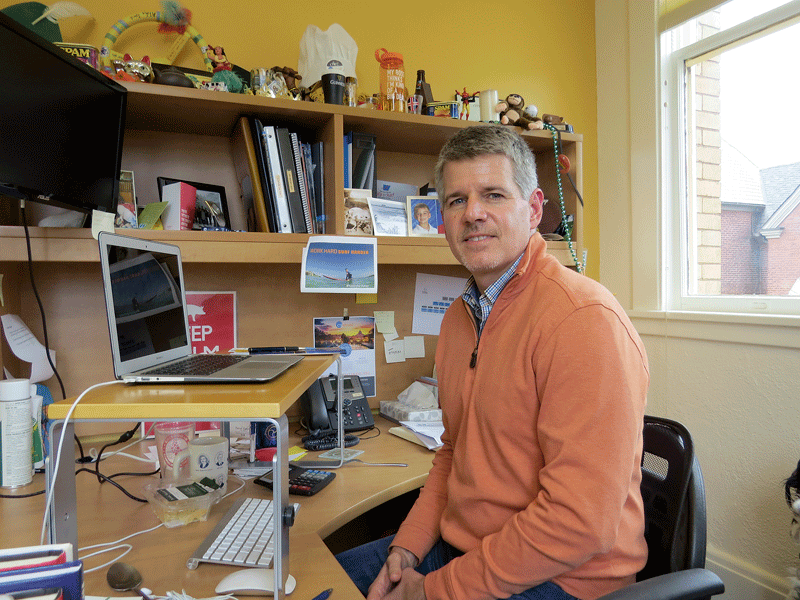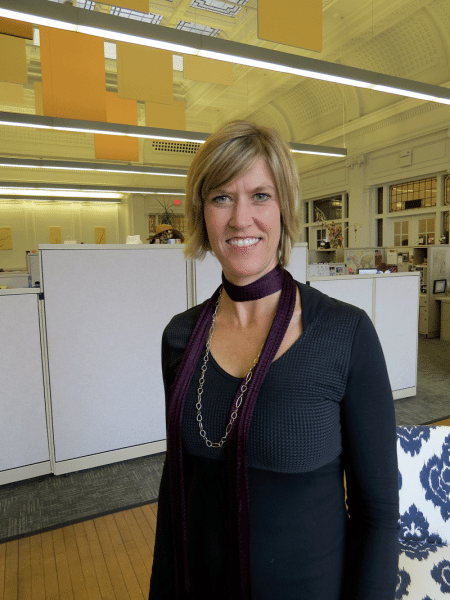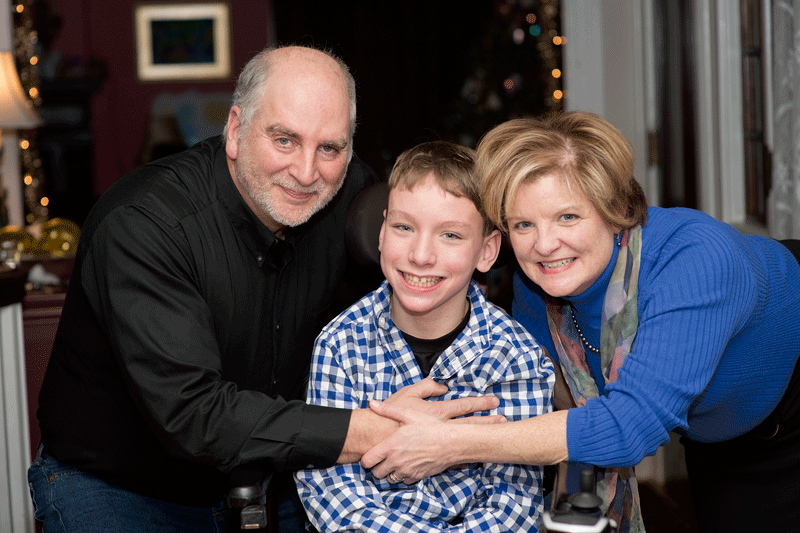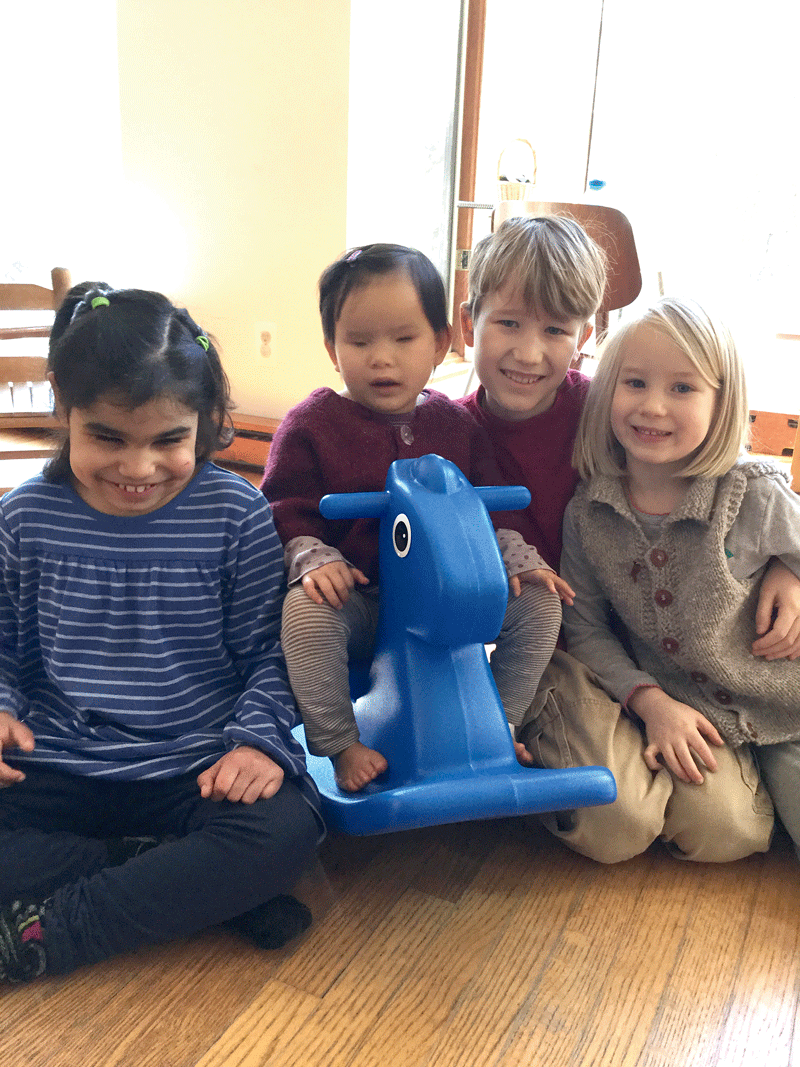WillPower Foundation
A Unique Nonprofit Meets Some Very Special Needs
Kim Schildbach says she and her husband bought the trampoline on Craigslist back in 2013.
The price tag was only $60, and that number spoke volumes about its condition. “It was in decent shape, but … we knew it had a little life left in it, but not a lot,” she told BusinessWest, adding that, not long after they brought Anelia, the young girl they adopted, to their home in Leverett from her native Bulgaria a year later, that trampoline’s life had pretty much run its course.
And giving it some new life became important, because Anelia is blind and has other developmental challenges, and bouncing on a trampoline is one of many forms of therapy for her.
Replacing the unit was simply not in the Schildbachs’ considerably tight budget, so they turned to a unique but somewhat obscure nonprofit they had heard about called the WillPower Foundation for some help.
They were told that families of special-needs children, or ‘children with different abilities,’ as this nonprofit prefers to call them, could apply for small grants — $500 is the limit — for items like, well, trampolines, that are needed but not covered by insurance, and certainly not in the category of ‘necessity.’ So they often fall through the cracks.
To make a long story a little shorter, the Schildbachs were somewhat dubious about applying for another grant — they had filled out the forms for several as part of the exhausting process of adoption — but did anyway, found it took just a few minutes online, and wound up getting a grant to resuscitate their trampoline, among other things.
“They paid to replace the bouncy floor part and the thing that goes around the outside,” said Schildbach, who didn’t know the technical terms for what WillPower paid for, but certainly does know how important that grant was and is to the quality of life for her daughter.
Just listen to this.
“I put a milk crate by the side of the trampoline,” she explained. “Anelia has learned to get up on the milk crate, put one leg up over the side of the trampoline, and push herself up. Anie is very globally delayed, but she has some superpowers, as we call them, and one of them is navigation; she uses her cane, and amazingly she has an awareness of the space around her in a way that … I can’t do when I’m walking around the house at night and the lights are off.
“She gets on that trampoline and bounces away,” Schildbach went on. “It’s so good for them to move their bodies, the endorphin release is good, and then there are these things called vestibular stimulation, which is any kind of movement that is soothing to kids who come from traumatic places.”
The Schildbachs have two blind children from traumatic, or ‘hard’ places, as Kim calls them — they adopted Mabel from China in 2016. And they have now received two grants from the WillPower Foundation to pay for everything from that trampoline to what are known as sensory toys.
And this is just one of dozens of families across the region to benefit from that nonprofit, which was inspired by and named for another young person with at least one super power, Will Burke. His is the ability to inspire others to live life to the fullest, to move above and beyond the many obstacles life can throw at someone, and to give back.
Born with a rare brain malformation and adopted by Maria and Craig Burke, Will underwent a number of surgeries and procedures early in life at the Shriners Hospital for Children.
His parents, desiring to find a way give back to the Shriners, started with a three-on-three basketball tournament, with the proceeds going to that institution. While the tournament thrived, the Burkes and a growing corps of supporters wanted to do more and also do something quite different.
After considerable thought, they created a foundation that would put money directly in the hands of families that needed it.
The foundation is approaching two important milestones — its 10th year of operation and the $200,000 mark when it comes to grants awarded to families across the region. Actually, it will mark three milestones in 2018, with the last one coming in March when Will Burke will make his way to the stage at the Log Cabin Banquet & Meeting House to accept the Difference Maker plaque from BusinessWest.
That plaque is in the shape of a butterfly, which, as most of you know by now, was chosen as a nod to the so-called ‘butterfly effect,’ whereby small and seemingly innocuous events like a butterfly flapping its wings can have a huge impact.
Perhaps no award winner in the program’s 10-year history better exemplifies the butterfly effect than the WillPower Foundation. The grants it issues are for only a few hundred dollars, but no one who receives one would ever use that word ‘only,’ because they are literally life-changing in nature.
Just ask Kim Schildbach.
Allowing Spirits to Soar
As she talked about WillPower and its importance within the community, Kim said the families of special-needs children, or, again, ‘those with different abilities,’ have lists of things they have to pay for.
Long lists, usually.
A $60 pair of cordless headphones for music-loving Anie (that’s another form of therapy for her)? Well, that would usually have to wait for “another week,” said Kim, adding that it might be many of those before the family, living on one income, could fit them in, if it ever did.
But through those two grants received from the Willpower Foundation, the family was able to get those headphones, as well as a rocking horse for Mabel, something called a “sensory backpack,” and some fidget toys, as they’re called — all things that insurance would not pay for and that would have had to wait for ‘another week.’
Missy Roy tells a similar story. Her daughter, now 7, has Down syndrome and needs a host of services and special equipment. But she also needs (and her family also needs) someone to advocate for her when it comes to school and other matters.
And insurance won’t cover the services of such a professional, which is unfortunate, said Roy, because some of these matters are technical in nature.
“When you’re just a parent, you don’t know all the ins and outs of school and what the law says,” she told BusinessWest. “You need an advocate, but insurance won’t pay for it.”
Such advocates charge $50 an hour for their services, and the $500 grant from the Willpower Foundation covered roughly two-thirds of her total bill. Likewise, another grant helped pay for a device to help’s Roy’s daughter communicate. Insurance covered 80% of the cost of a device known as an Accent 1000 (sticker price: $7,000), but Roy had to cover the rest. Her load was lightened appreciably by a second $500 grant.
Life-easing episodes like these are the kind the Burkes and the board they would assemble had in mind when they took the Willpower Foundation off what amounts to the drawing board and made it the truly unique nonprofit that it is.
And as they did so, they drew on their own experiences early and often. Will was born prematurely and was adopted by the Burkes when he was just seven weeks old. The couple had what they described as a huge support system of family and friends, and they relied on it.

Jeff Palm says the WillPower Foundation strives to be as “unbureaucratic” as possible as it helps parents pay for equipment and services that fall between the cracks.
“We had a lot of support from our families, but as we went along, we knew we had to get some help,” said Craig Burke. “And while Marie is so awesome at making things work, a lot of things were not accessible to us financially or just available at all.
“So we vowed that, someday, once we got through all this, we would try to do something to do give back,” he went. “We received a lot of support early on, but there were a lot of out-of-pocket expenses, and we knew others were facing the same challenge.”
So, in essence, the Burkes created a different kind of support system in the form of a nonprofit that would help with those expenses. In the beginning, Craig recalled, one of the early concepts discussed was to create something approaching a ‘make a wish’ format involving parents, whereby, through $1,000 grants, they could take some time off for themselves, something that is often very difficult to do, and their children would be cared for by a professional.
What they found, said Maria Burke — and they already knew this from experience — is that the parents of special-needs children don’t ever want to leave them. So the model for the nonprofit evolved into providing grants for items families need but that insurance won’t cover.
And when it came time for affix a name to this nonprofit, well, that was probably the easiest part.
Indeed, Will has been inspirational in many ways as he confronts, and overcomes, the many challenges he faces, said Maria, adding that his spirit and tenacity actually empowers others to reach their full capabilities.
A huge fan of video games and Rob Gronkowski, and an even bigger fan of blue cheese — the first thing the Burkes do when they arrive at a restaurant is ask if it’s on the menu — Will is involved with the nonprofit on many levels and enjoys being part of efforts to give back.
“I like to help people,” he said in a somewhat slow voice that is difficult to understand at first. But he gets his points across. “I like to help them by getting them what they need.”
Getting a Lift
Jeff Palm, chairman of the foundation’s board and a long-time supporter of the Burkes’ efforts, said the goal at the beginning — and it has persisted to this day — is to make the awarding of grants as “unbureaucratic” as possible. That’s not a word, and he acknowledged as much, but you certainly get the point.
If ‘unbureaucratic’ was a word, it would be synonymous with simple, which is what the foundation works very hard to make the application process. Just ask Kim Schildbach. She’s filled out hundreds of forms in the process of adopting their first two and now a third child.
“We make sure that we’re crossing our ‘T’s and dotting our ‘I’s and that we’re not just throwing people’s trusted money out the door,” Palm explained. “But we try to make it simple; we put money in the hands of families, and we fund really interesting and unusual things that make a child’s life easier and, as a result, make a family’s life easier.”
Elaborating, he said WillPower enables families to acquire equipment and services that essentially fall through the cracks.
And, perhaps not surprisingly, this is a big list. It includes everything from therapeutic horseback riding to the services of a speech-language pathologist; from electrical outlets with the proper voltage needed for a ventilator to the percentage of an Accent 1000 not covered by insurance.
To explain the importance of such grants, Palm used the example of that electrical outlet.
“The child had a ventilator that would plug only into a 220 plug, like a dryer plug,” he explained. “Every time that respirator needed to be on for the child, they had to wheel him over to that corner of the house and plug it in.
“They applied to us for a grant, and we found an electrician to put that plug in a place that was much more convenient for the family, and the child could be part of the family unit when the ventilator was needed,” he went on. “You just wouldn’t find an insurance company that would pay for something like that, and there are a lot of stories like that.”
Sarah Aasheim, interim executive director of the foundation, agreed, and noted that the nonprofit fills gaps that most people not in the situations these families find themselves in couldn’t appreciate.

Sarah Aasheim says the WillPower Foundation helps to close gaps that those on the outside looking in might have a hard time understanding.
“These are things that you often don’t think about,” she told BusinessWest. “The ventilator was covered by insurance, of course, so from the outside looking in, it looks like that family would be all set. But when you understand the nuances of these situations, you realize that there are a lot of unmet needs.”
As another example, she noted the kind of assistive technology that Will uses to help him communicate, called a ‘talker.’ One child who relied on such technology faced another of those funding gaps that might be hard for others to grasp.
“This child used a wheelchair, and while the insurance company paid for the device, it didn’t pay for the mount that goes on the child’s wheelchair, which costs an additional $300, which is a financial hardship for this family,” she explained. “The child had a talker, but he couldn’t access the talker because he didn’t have the motor skills to hold it and it didn’t work with his wheelchair, so we supplied the funding for that. Sometimes it’s just a bridge or a connection to meet a larger need.”
By filling these gaps, the foundation is empowering not only individuals, but their families as well, said Emily Albelice, former executive director and now a board member.
“That child’s ability to communicate better serves the entire family unit,” she said referring to the device mounted to a wheelchair. “And that’s something that’s important to us; it’s not just about the individual, but their family, their friends, their community.”
Fortuitous Bounce
Stories such as these make it easy to understand why the WillPower Foundation is far less obscure than it was years ago. Indeed, word of mouth has served as a very powerful marketing vehicle for the organization, because the word being spread — and it has spread quickly and effectively — is just how unique and game-changing the foundation’s work is.
“When families that are experiencing financial hardship find out there’s a resource that gives them cash — albeit a small amount — for something they determine they need, the word spreads very quickly,” said Aasheim, adding that, as word spreads and the volume of grant applications grows, the challenge then becomes raising more money to fund more of those requests.
Fortunately, just as this nonprofit resonates with those it helps through grants, it also resonates with those who recognize the uniqueness of the mission, the level of need, and the fact that many of these families don’t have many other options, if any at all.
Thus, support is growing, and the foundation’s board is looking to increase annual grant awards to $30,000, an ambitious goal made possible by the help of individuals and businesses that, as noted, and in very simple terms, can relate.
“The more we spread the word, the more information about what we’re doing gets out, the more the local community as a whole wants to support families like ours,” said Maria Burke. “Honestly, almost everyone you meet knows someone with a disability, and every business has an employee with a family member with a disability. Everybody can say they know someone who is facing these challenges every day, and that’s why they embrace our mission.”
The foundation stages fund-raisers, solicits donations, and benefits from the support of several primary sponsors — the law firm Alekman DiTusa, Orthotics and Prosthetics Labs, and LePage Financial Group.
Ryan Alekman and Robert DiTusa, partners at the law firm, said it is active in the community in a number of ways, and that the work of the WillPower Foundation dovetails nicely with its overall philosophy when it comes to giving back.
“We can see our money doing a lot of good with a smaller organization, as opposed to putting the same amount into a giant nonprofit,” said Alekman, adding that the firm prefers to support nonprofits and initiatives where the results are visible and tangible, and the WillPower Foundation certainly fits that description.
DiTusa agreed, and said the foundation produces these kinds of visible results with families that are truly in need and often have no other recourse.
“There are so many gaps in insurance, and most people really don’t understand that,” he explained. “They figure ‘that family has health insurance, those kids must be fine, they’re taken care of.’
“But if you have a disabled child, there’s a ton of things that they’re going to need that are not covered by insurance,” he went on. “The gaps are enormous, and if have a nonprofit like the WillPower Foundation that steps in and fills those gaps, that can make an enormous difference in a child’s life.”
Just ask Kim Schildbach. Or Missy Kim. Or Will Burke.
Reaching New Heights
Maria Burke remembers talking with the young mother of a child with special needs at a recent gathering of such parents. The conversation came around to how insurance often doesn’t cover the cost of many seemingly small but nonetheless significant services, leaving families scrambling.
And the woman mentioned that she heard about this unique nonprofit called the WillPower Foundation that actually awards small grants to the families of such individuals so that these gaps could be closed, and that it was certainly worth checking it out.
Burke quietly took those comments under advisement — without letting on that this was her baby, as they say.
That’s because her real baby is the inquisitive guy in the wheelchair with those superpowers mentioned earlier, especially the ability to inspire and empower others to do what they might have thought was beyond their reach.
Will’s been setting the bar higher and then clearing it his whole life, and the foundation created in his name is enabling individuals of different abilities and their families to do the same.
And thus, it’s truly worthy of that plaque shaped like a butterfly and the designation ‘Difference Maker.’
George O’Brien can be reached at [email protected]







